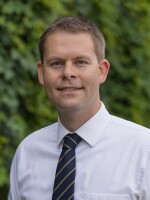On March 5, 1946, the small town of Fulton, Missouri, ballooned more than two times in size. More than 25,000 people lined the streets to greet Winston Churchill. The former British prime minister had been victorious in World War II but had lost reelection in his homeland.
Looking to get back in the game and with numerous speaking invitations, one stood out — and it included a remarkable postscript: “This is a wonderful school in my home state. Hope you can do it. If you come, I will introduce you. Harry S. Truman.”
Churchill accepted, and the speech at Westminster College, officially called “The Sinews of Peace,” became known as the “Iron Curtain” speech. It signaled the beginning of the Cold War.
“With a little bit of pluck, determination and a good alumni network, we made it happen,” Tim Riley explained Tuesday on St. Louis on the Air. Riley is the Sandra L. and Monroe E. Trout director and chief curator at America’s National Churchill Museum at Westminster.
Churchill’s journey to the middle of the United States started aboard the RMS Queen Elizabeth, which crossed the Atlantic Ocean in January 1946.
“He did what a lot of very wise people do. He made a beeline in the winter to Florida,” Riley said. “He spent a couple of months in Miami Beach, took a quick trip to Cuba and all the while was relaxing, painting … and [crafting] the early versions of the Iron Curtain speech."

Ultimately, Churchill would travel to Washington, D.C., and then hop aboard a train with President Truman.
The train ride included “poker diplomacy,” a story Riley said would later be shared by American broadcaster David Brinkley.
“Harry Truman, as we know, was an avid poker player who loved the game and was quite good at it,” Riley explained. “Churchill loved cards, loved to gamble, but was not as good at playing poker as Truman and started to lose rather large sums of money. And at one point, as Brinkley recounts the story, Churchill left the train car for a moment to use the restroom or something.
“Truman told his men, ‘You know, listen, we got to let the old man win. This is a very important person to the world. We can't let him take a bath here in our poker game.’ So one by one, the reporters and the Americans kept their aces to themselves and let Churchill come back.”
Riley said the time Churchill and Truman spent together helped forge better relations between the two countries.
After arriving in Jefferson City, the world leaders took cars 24 miles to Fulton, but not before one of them broke down along Highway 54. Just outside town, Churchill famously requested the motorcade pull over so that he could light a cigar.
In Fulton, the duo’s presence was an enormous event.
“It was a very, very big deal locally, globally and geopolitically, the address that was given. It was really a special occasion,” Riley said.
Riley also discussed what Churchill drank and ate during his time in Missouri, including a rave review of a Callaway County ham.
“I believe the pig has reached its highest state of evolution in the form of this ham,” Churchill would exclaim during the pre-speech luncheon.
Riley’s appearance on the talk show came just ahead of Westminster’s planned 75th anniversary celebration of the speech later this week, when dignitaries, scholars and members of the Churchill family will participate in a livestreamed program.
Related Event
What: 75th Anniversary of “Sinews of Peace”
When: Friday and Saturday
Where: Streamed live from Fulton
More information
“St. Louis on the Air” brings you the stories of St. Louis and the people who live, work and create in our region. The show is hosted by Sarah Fenske and produced by Alex Heuer, Emily Woodbury, Evie Hemphill and Lara Hamdan. The audio engineer is Aaron Doerr.






